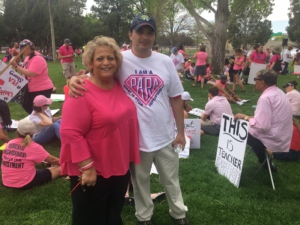Educators in Pueblo, Colorado’s District 60 went on strike on May 7, marking the first teachers’ strike in Colorado in 24 years. This action, in a district that pays teachers well below the national average, closely follows a wave of teacher uprisings in states like Arizona, West Virginia, Kentucky, and Oklahoma. Just a few weeks ago, an action by educators in Denver saw a turnout of thousands from nearly 30 districts across the state.
Rallies in Pueblo this week are seeing large turnouts from local unions, educators, parents, and students of all ages. Pueblo teachers are demanding a 2 percent raise and a $30 increase per month in health insurance benefits, as well as a 2.5 percent cost-of-living raise for paraprofessionals, well below the 3.4 percent cost-of-living increase projected for the upcoming year. A third-party fact finder recommended the raise and determined that the district has the funds, but the Pueblo Board of Education maintains they will be unable to meet the teachers’ demands until next year, when the school week will be cut back to four days. Teachers say their strike hinges not on a lack of funds but on the priorities of the Pueblo Board of Education and District 60 leaders.
Lois Conatore-Houp has been a teacher for almost 35 years. She says that the district continues to hire administrators from outside of the local schools, while teachers, paraprofessionals, and parents are forced to subsidize the cost of education. Contatore-Houp was shocked by the extensive school supply lists that parents received this year which even included cleaning supplies. She asked, “What are the tax dollars of Puebloans being spent on? … If the priorities were right, that wouldn’t be happening. It’s ridiculous. I asked, ‘Is there toilet paper on the list too?’”
Laurie Gonzalez Torres, a paraprofessional in Pueblo, pointed to the amount of money she spends on her classroom. For her, a 2.5 percent raise would amount to only about “$40 per check, which isn’t much, but it helps to offset what I spend on my classroom alone. We supply all of our school supplies and holiday stuff; we go out and buy the stuff to do art projects… It all falls back on us.” Gonzalez Torres, a mother of three, says that “if it wasn’t for my husband who has his full-time job, I’d be in major trouble.”
Paraprofessionals, who provide interpretation for English learners and support for students with disabilities, earn starting salaries of about $19,000 a year. As class sizes grow and paraprofessionals take on more responsibility in the classroom, they are left wondering when their pay will catch up. Paraprofessional Gerald Arthur Jaramillo, who gets by living with
roommates, spoke to the hypocrisy of the Pueblo administrators who have so far rejected the proposed salary bump: “What we’re asking for is not what we feel like we’re entitled to, but rather what the budget says that it can handle…They don’t want to give us a raise. And not only that, but [administrators] have voted for their own raises every year.”
The strike in Pueblo mirrors the situation in schools around the country: educators are fed up, and their demands are supported by students, parents, local unions, and the broader community. While local school districts, state officials, and the federal government refuse to find the money to pay educators a living wage, teachers are standing strong. Jim Cain, a 5th
grade teacher at Morton Elementary, saw his union give in once before, 13 years ago. “We took the first offer that they gave us. I think if we would’ve held out then, we wouldn’t be where we are now, so I’m so happy we’re holding out and doing the right thing.” He is optimistic. He said, “The parent support and community support has just been phenomenal. I think that’s gonna make the difference, because I think we’ve got Pueblo behind us.”







